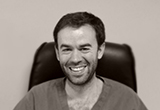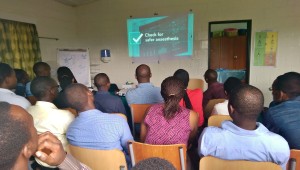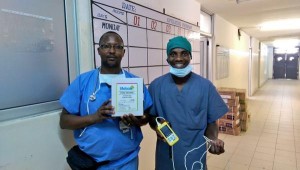 Lifebox Foundation is celebrating surgery and anaesthesia humanitarian heroes for WHD. Follow our #HumanitarianHeroes campaign on Twitter, Facebook, and Instagram to find out more.
Lifebox Foundation is celebrating surgery and anaesthesia humanitarian heroes for WHD. Follow our #HumanitarianHeroes campaign on Twitter, Facebook, and Instagram to find out more.
When I was 4 years old I had grommets inserted in both ears—small plastic tubes through the eardrum to help resolve an infection. Around the same time I had a mole excised from the back of my right hand. Both were under general anaesthetic, and all were straightforward procedures. I don’t remember much myself, but I’m sure my parents appreciated the years of skilled training behind each practitioner involved in my care, and the resources and systems that were in turn supporting them.
It was many years later that I paused to think about this surgery again. Working with Lifebox Foundation in Africa, I experienced first hand the difficulties in accessing essential surgical care. To make matters worse, a lack of basic safety checks for those procedures that did take place were set amidst an overwhelmed healthcare system exhausted at supporting what little capacity it could provide. Only then did I fully appreciate how a minor operation quickly became a high-stakes struggle in countries less fortunate than ours.
In these settings a lack of surgical and anaesthesia equipment is compounded by an underdeveloped infrastructure—it’s not uncommon for the electricity to fail mid-operation, and the luxury of a pulse oximeter or even supplemental oxygen is the exception rather than the rule. Human resources are limited, and training remains an essential central component for lifting the capacity of the whole surgical system. Even basic perioperative safety checks take time to implement in places where operating teams have no culture of sharps, swabs, and instrument counts, or pausing to confirm the operative site.
 Previously described as “the neglected stepchild of global health,” surgery has in recent years risen to meet this challenge of extending capacity and expertise into corners of the world where currently little or none exists. Anaesthetic care goes hand-in-hand with this, and both are incorporated into the work that many undertake with Lifebox, making surgery safer in low-resource settings around the world. But there remains much more to be done. The recent Lancet Commission on Global Surgery † estimated that some 312·9 million surgical procedures were undertaken worldwide in 2012. Depressingly, only 6·3% were done in countries comprising the poorest 37·3% of the world’s population. This leaves an estimated 5 billion unable to access safe surgery when they need it.
Previously described as “the neglected stepchild of global health,” surgery has in recent years risen to meet this challenge of extending capacity and expertise into corners of the world where currently little or none exists. Anaesthetic care goes hand-in-hand with this, and both are incorporated into the work that many undertake with Lifebox, making surgery safer in low-resource settings around the world. But there remains much more to be done. The recent Lancet Commission on Global Surgery † estimated that some 312·9 million surgical procedures were undertaken worldwide in 2012. Depressingly, only 6·3% were done in countries comprising the poorest 37·3% of the world’s population. This leaves an estimated 5 billion unable to access safe surgery when they need it.
I am not alone in seeking to address these inequalities through my humanitarian work in low-resource countries. Without the commitment of many surgeons and anaesthetists, it would be impossible to make a sustainable change. But what pushes us to make our personal investment in this? From my own experience, many factors contribute. The potential to make a meaningful impact through this work far outweighs the opportunities available in my comparatively comfortable day job at home. The challenge of working in different systems and cultures so far removed from this is a fulfilling experience. The involvement with, and learning from, local colleagues with such different perspectives of healthcare is revealing and informative for both. There is no doubt that these experiences ultimately enrich and enhance my practice when I return home—even as simply reminding me that no matter how tough an on-call is, I can at least provide timely, safe care when it is needed.
 Access to safe surgery and anaesthesia is an important human right as part of wider initiatives to address inequalities in global health. My contribution to this big picture may be small, but my work is a shared bond with many who hope that together we will make a difference. For all those healthcare workers around the globe, World Humanitarian Day is a moment to celebrate the spirit that inspires their work wherever they are. Against this backdrop, my own experiences with minor surgery seem relatively inconsequential. But my grommets sorted out my hearing safely, and, all these years later, I hope this means I’ll hear you taking a moment to celebrate global humanitarian work too.
Access to safe surgery and anaesthesia is an important human right as part of wider initiatives to address inequalities in global health. My contribution to this big picture may be small, but my work is a shared bond with many who hope that together we will make a difference. For all those healthcare workers around the globe, World Humanitarian Day is a moment to celebrate the spirit that inspires their work wherever they are. Against this backdrop, my own experiences with minor surgery seem relatively inconsequential. But my grommets sorted out my hearing safely, and, all these years later, I hope this means I’ll hear you taking a moment to celebrate global humanitarian work too.
† http://www.sciencedirect.com/science/article/pii/S014067361560160X
Edward Fitzgerald is a general surgery registrar currently undertaking a Fellowship with the Lifebox Foundation. He is on Twitter @DrEdFitzgerald
Competing interests:
1) Honorary Clinical Advisor to the Lifebox Foundation (unpaid)
2) Trustee of the SURG Foundation charity (unpaid)
3) Paid consultancy for iMPOWER, http://www.impower.co.uk/
4) Assistant Editor, International Journal of Surgery (unpaid)
